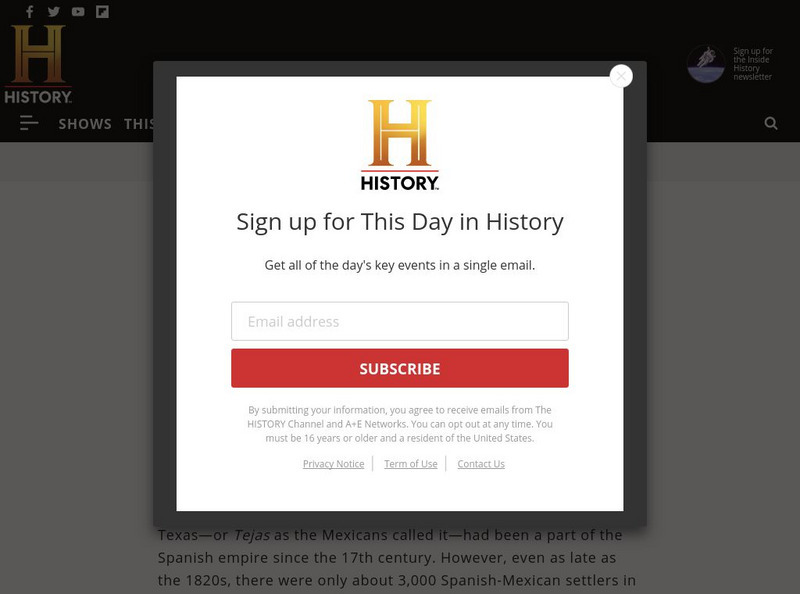A&E Television
History.com: What's So Unlucky About the Number 13?
Unexplained fears surrounding the number 13 can be traced to ancient times. Researchers estimate that as many as 10 percent of the U.S. population has a fear of the number 13, and each year the even more specific fear of Friday the 13th,...
A&E Television
History.com: Woodstock 1969: How a Music Festival That Should've Been a Disaster Became Iconic Instead
Fifty years later, people are still trying to match the bizarre accident that was Woodstock '69. The Woodstock Music and Art Fair began on August 15, 1969, as half a million people gathered on a dairy farm in Bethel, New York. Billed as...
A&E Television
History.com: Why the Watershed 1969 Harlem Cultural Festival Was Overshadowed for 50 Years
The 1969 Harlem Cultural Festival brought over 300,000 people to Harlem's 20-acre Mount Morris Park from June 29 to August 24, 1969 against a backdrop of enormous political, cultural and social change in the United States. The summer...
A&E Television
History.com: Steps Leading to the Fall of Saigon and the Final, Chaotic Airlifts
The conflict in Vietnam ended in 1975 with the largest helicopter evacuation of its kind in history. What led to the fall of Saigon? Although the United States had withdrawn its combat forces from Vietnam after the signing of the Paris...
A&E Television
History.com: How Paul Revere's Engraving of the Boston Massacre Rallied the Patriot Cause
A silversmith by trade, Revere also produced copperplate engravings for book and magazine illustrations, portraits and political drawings that supported the nascent Patriot movement. Reveres most effective piece of anti-British...
A&E Television
History.com: 8 Athletes Who Excelled at Two Sports
The odds of becoming a professional athlete are long. The odds of playing more than one sport well against elite competition are astronomical. Here are athletes who were blessed with the skill to excel - some even just briefly - in...
A&E Television
History.com: How the Columbian Exchange Brought Globalization and Disease
Christopher Columbus' arrival in the Caribbean in 1492 kicked off a massive global interchange of people, animals, plants and diseases between Europe and the Americas.
A&E Television
History.com: What Did the Three Continental Congresses Do?
During the Revolutionary War, the Continental Congress became America's de facto government. Over a period of 15 years, from 1774 to 1789, the Continental Congress underwent a profound evolution. Starting out as a temporary group that...
A&E Television
History.com: 6 Inventions That Transformed Housework
Electric appliances large and small promised reduced drudgery. Most people take washers and refrigerators for granted today, a century ago, these machines revolutionized people's daily lives. The introduction of running water and...
A&E Television
History.com: History on a Plate: How Native American Diets Shifted After European Colonization
For centuries, Indigenous people's diets were totally based on what could be harvested locally. Then white settlers arrived from Europe. Native people pass down information - including food traditions - from one generation to the next...
A&E Television
History.com: Native American History Timeline
As explorers sought to colonize their land, Native Americans responded in various stages, from cooperation to indignation to revolt. The timeline begins in 1492 with the arrival of Christopher Columbus and ends on March 15, 2021:...
A&E Television
History.com: Continental Congress
From 1774 to 1789, the Continental Congress served as the government of the 13 American colonies and later the United States. The First Continental Congress, which was comprised of delegates from the colonies, met in 1774 in reaction to...
A&E Television
History.com: 6 Key Inventions by Thomas Edison
Edison's genius was improving on others' technologies and making them more practical for the general public. Thomas Edison applied for his first patent in 1868, when he was just 21 years old. The famous inventor's first brainchild was...
A&E Television
History.com: 5 Iconic Mashup Inventions That Have Stood the Test of Time
The clock radio, multi-tool pocket knife, and smartphone are all examples of mashup inventions: the combination of two or more ideas in a different configuration to create something new and productive, says Bernie Carlson, a history...
A&E Television
History.com: 9 Groundbreaking Inventions by Women
Women inventors are behind a wide range of key innovations, from Kevlar to dishwashers to better life rafts. Female inventors have played a large role in U.S. history, but haven't always received credit for their work. Women --...
A&E Television
History.com: How Levee Failures Made Hurricane Katrina a Bigger Disaster
By the time Hurricane Katrina made landfall near Buras, Louisiana early on the morning of August 29, 2005, the flooding had already begun. In all, levees and floodwalls in New Orleans and surrounding areas fell in more than 50 locations...
A&E Television
History.com: Hurricane Katrina
Early in the morning on August 29, 2005, Hurricane Katrina struck the Gulf Coast of the United States. While the storm itself did a great deal of damage, its aftermath was catastrophic Levee breaches led to massive flooding, the federal...
A&E Television
History.com: Hurricane Katrina: 10 Facts About the Deadly Storm and Its Legacy
Hurricane Katrina, the tropical cyclone that struck the Gulf Coast in August 2005, was the third-strongest hurricane to hit the United States in its history at the time. With maximum sustained winds of 175 mph, the storm killed a total...
A&E Television
History.com: How Toussaint L'ouverture Rose From Slavery to Lead the Haitian Revolution
Pushing back aggressions by Europe's greatest powers, Haiti's 'founding father' set the stage for the world's first sovereign Black state. How did Toussaint L'ouverture born into bondage in the French colony of Saint-Domingue...
A&E Television
Biography: Amerigo Vespucci
A brief overview of the life of explorer Amerigo Vespucci.
A&E Television
History.com: First Shots of Texas Revolution Fired in Battle of Gonzales
A brief description of the Battle of Gonzales on October 2, 1835 when the Mexicans attempted to take a cannon and were rebuffed, precipitating the start of the Texas Revolution.
A&E Television
History.com: This Day in History: Texas Enters the Union
On December 29, 1845, Texas officially joined the Union as a slave state, after lengthy delays.
A&E Television
History.com: Russian Revolution
This site contains information about the Russian Revolution, including information about Russia before and after.
A&E Television
Biography: Aristotle
This resource offers a three page biography of Greek philosopher and scientist, Aristotle.





